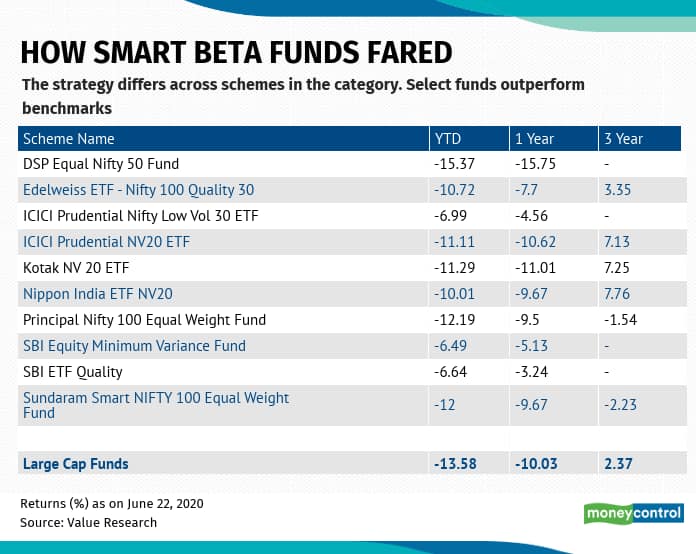
How can you earn more than market returns and still avoid going into unchartered territories such as investing in unheard of small-sized companies? Smart beta funds may help you outperform. Though these funds are expected to act as a bridge between passive and active strategies, their limited track record in the Indian market is not convincing. If at all, you may enter only with a long-term view to benefit from these funds.
Select strategies do well
Over the last three years, smart beta funds tracking the Nifty 50 Value 20 index did well. This index consists of 20 companies selected on the basis of their return on capital employed (ROCE), price-earnings (PE), price to book value (PB) and dividend yield (DY). For example, Kotak NV 20 ETF and ICICI Prudential NV20 ETF delivered 7.25 per cent and 7.13 per cent over the three-year period, respectively. The Nifty50 TRI over past three years gave 3.61 per cent returns. Large-cap equity funds delivered 2.37 per cent. “The portfolio is concentrated with the top 20 value stocks from the Nifty 50 universe. Portfolio's overweight position in information technology and consumer goods has helped to generate positive returns,” says Chintan Haria, Head Product Development & Strategy, ICICI Prudential AMC.
But not all smart beta funds outperformed the Nifty 50 Index. DSP Equal Nifty 50 lost 15.75 per cent over the last one year compared to the 11.03 per cent loss of the Nifty 50 TRI index. Large-cap funds as a category lost 10.03 per cent on an average over same period. “We have seen a few large-cap stocks doing extremely. In an equal weight strategy, we hold all stocks with equal allocation,” explains Anil Ghelani, Head of passive investments and products, DSP Investment Managers. In a rally led by a few stocks, this strategy tends to underperform, but in a broad-based rally in equity markets, this strategy should outperform, like we have been seeing in the past few months. Instead of betting on a few stocks, investors should opt for exposure across stocks and sectors in the long term, he adds.
Is smart beta, an active or a passive strategy?
Smart beta funds invest in an index such as Nifty 50, but allocate sums to each one stock based on some factors that the fund manager defines. For example, DSP Equal Nifty 50 Fund, allocates equal amounts to each of the stocks present in the Nifty 50. Edelweiss ETF-Nifty 100 Quality 30, aims to track Nifty Quality 30 Index, which includes top 30 companies from its parent NIFTY 100 index, selected based on their quality scores arrived at using return on equity, financial leverage and earnings growth.

The objective is to better the performance driven by market capitalization driven traditional stock indices. “Smart beta funds aim to bring in rule-based active management of investments and remove human emotions while making investment decisions,” says Ghelani.
If a strategy fails to deliver in a particular environment, then the fund manager cannot try something else.
Also, some of the strategies lead to concentrated portfolios. For example, NV20 strategy mentioned above has 20 stocks in the portfolio – Tata Consultancy Services (TCS), Infosys, ITC account for around 15 per cent exposure each. Infosys, TCS and Hindustan Unilever, which had 12.8 per cent weight did well and rewarded investors. Typical diversified equity mutual funds have 40 to 60 stocks in their portfolios. Concentrated portfolios can lead to volatility during rallies as well as falls.
The small asset size of these funds leads to low volumes and mars liquidity for investors.
Should you invest?
Vishal Jain, head, Nippon India ETF, says that the moment you go beyond market capitalization weighted indices, you are in the domain of actively managed funds. “Smart beta funds can be a part of your actively managed portfolio.” he adds.
“While taking large-cap equity exposure in your portfolio, employ a mix of index and smart beta funds to benefit from both passive and active strategies at low costs,” says Ghelani.
Some experts sound a word of caution. “Prefer low volatility focused funds over equal weight strategy,” says Vishal Dhawan, founder and chief financial planner of Plan Ahead Wealth Advisors.
Executing the strategy is a serious issue, given the low liquidity faced by these schemes. Investors cannot set up systematic investment plans, given the fact that they are ETFs and are traded on stock exchanges. For strategies such as quality and value, such investors can also look at traditional open-ended actively managed equity funds. Of course, open-ended funds come with extra cost.
Smart beta funds are slowly coming into their own with select fund houses taking to them. But these are still early days. Pockets of outperformance in a wide basket of smart beta funds that come in varying strategies make it difficult to choose a winner. New investors should avoid smart beta funds. Only if your portfolio is already well diversified, can you consider having one such fund in your portfolio, if you fully understand and like the strategy that is. It could be a part of your satellite portfolio. Be prepared for short-term volatility and concentration risk.
Discover the latest business news, Sensex, and Nifty updates. Obtain Personal Finance insights, tax queries, and expert opinions on Moneycontrol or download the Moneycontrol App to stay updated!